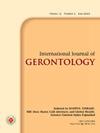重复经颅磁刺激与认知训练的认知效果:长期缓解轻度阿尔茨海默病的神经退行性影响
IF 0.3
4区 医学
Q4 GERIATRICS & GERONTOLOGY
引用次数: 1
摘要
背景:尽管有几项研究报道了重复经颅磁刺激(rTMS)对阿尔茨海默病(AD)的认知影响,但迄今为止还没有研究涉及rTMS与认知训练(CT)的长期影响。本研究旨在探讨rTMS-CT对轻度AD的长期影响。方法:招募根据《精神障碍诊断与统计手册- iv》诊断的轻度AD患者(Mini-mental Status Examination [MMSE]评分21-26分),按2:1的比例随机分为治疗组和假手术组。我们将乙酰胆碱酯酶抑制剂(AChEI)组与治疗组进行对比,比较rTMS-CT的长期效果。治疗组采用高频(10 Hz) rTMS-CT治疗6周,另一组采用假治疗6周。这些组在基线、rTMS-CT后立即和最后一次rTMS-CT后6周进行神经心理测试。分析单纯治疗组和治疗组3年内认知评分(MMSE)和临床痴呆评分-盒量表总和的变化。结果:44例轻度AD患者(平均年龄72.5岁;rTMS-CT组(n = 30)与假手术组(n = 14)相比,ADAS-Cog评分在12周内有所改善。在3年的随访中,rTMS-CT组显示神经退行性变的发生率低于仅使用achei组(n = 60)。结论:与单纯使用乙酰胆碱酯酶抑制剂相比,使用rTMS-CT可能是一种有用的辅助干预策略,可以长期缓解轻度AD的神经变性。本文章由计算机程序翻译,如有差异,请以英文原文为准。
Cognitive Effect of Repetitive Transcranial Magnetic Stimulation with Cognitive Training: Long-Term Mitigation Neurodegenerative Effects of Mild Alzheimer's Disease
Background: Despite several studies having reported on the cognitive effects of repetitive transcranial magnetic stimulation (rTMS) in Alzheimer's disease (AD), no studies, to date have addressed the long-term effects of rTMS with cognitive training (CT). This study was aimed to investigate the long-term effects of rTMS-CT in mild AD. Methods: Patients with mild AD (Mini-mental Status Examination [MMSE] score of 21-26), diagnosed based on the diagnostic and statistical manual of mental disorders-IV, were recruited and randomly allocated to two groups, treatment and sham, in a 2:1 ratio. We matched the acetylcholinesterase inhibitor (AChEI)-only group to the treatment group to comparing the long-term effect of rTMS-CT. Treatment group was treated for 6 weeks with high-frequency (10 Hz) rTMS-CT, whereas the other group received 6 weeks of the sham management. These groups underwent neuropsychological tests at baseline, immediately after rTMS-CT, and 6 weeks after the last rTMS-CT. Data of AChEI-only and treatment groups were analyzed changes of cognitive scores (MMSE, and clinical dementia rating-sum of boxes scales) over 3 years. Results: Among the 44 enrolled mild AD (mean age, 72.5 years; females, 36.4%), the rTMS-CT group (n = 30) showed improvement on the ADAS-Cog score for 12 weeks compared with the sham group (n = 14). The rTMS-CT group showed slower rates of neurodegeneration than those in the AChEI-only group (n = 60) during the 3 years of follow-up. Conclusions: Compared to the administration of AChEI only, the use of rTMS-CT might be a useful supplementary interventional strategy in mild AD for long-term mitigation of neurodegeneration.
求助全文
通过发布文献求助,成功后即可免费获取论文全文。
去求助
来源期刊
CiteScore
0.60
自引率
0.00%
发文量
0
审稿时长
6-12 weeks
期刊介绍:
The Journal aims to publish original research and review papers on all fields of geriatrics and gerontology, including those dealing with critical care and emergency medicine.
The IJGE aims to explore and clarify the medical science and philosophy in all fields of geriatrics and gerontology, including those in the emergency and critical care medicine. The IJGE is determined not only to be a professional journal in gerontology, but also a leading source of information for the developing field of geriatric emergency and critical care medicine. It is a pioneer in Asia.
Topics in the IJGE cover the advancement of diagnosis and management in urgent, serious and chronic intractable diseases in later life, preventive medicine, long-term care of disability, ethical issues in the diseased elderly and biochemistry, cell biology, endocrinology, molecular biology, pharmacology, physiology and protein chemistry involving diseases associated with age. We did not limit the territory to only critical or emergency condition inasmuch as chronic diseases are frequently brought about by inappropriate management of acute problems.

 求助内容:
求助内容: 应助结果提醒方式:
应助结果提醒方式:


